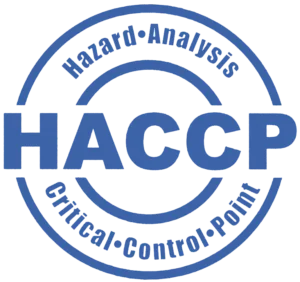How to get HACCP Certification
About HACCP Certification
HACCP is short for Hazard Analysis and Critical Control Point. HACCP became famous as an effective measure to ensure food safety. HACCP has been used in the food industry to ensure that food reaches consumers in a safe condition. HACCP is also an effective way of preventing cross-contamination and ensuring proper cooking, storage, and handling procedures are followed. HACCP certification provides formal recognition that an individual or company possesses the knowledge and expertise needed to develop HACCP plans and HACCP systems that comply with food safety legislation.

How to Get HACCP Certification: Guidelines
The following are the general steps involved to get HACCP Certification:
- Initial Registration and Product Validation, which includes checking the client’s registration details.
- Facility Evaluation: to ensure that all necessary equipment is present and appropriately labeled, a physical walk-through of the facility is undertaken. Following that, a review of company paperwork, including Standard Operating Procedures, is performed.
- Initial Product Evaluation: samples of the process are gathered and evaluated to see if the product complies with regulatory parameters. Any accessible lab reports, certificates of analysis, or other paperwork relevant to the product’s safety is examined.
- Flow Diagram Development: a flow diagram is created that depicts all steps in the process as well as who is responsible for each one. For all necessary tests, both arriving raw materials and outgoing completed products, protocols are devised.
- Product Stability & Reliability Testing: three production runs of the product are tested at least 14 days apart for stability.
- Review of Test Procedures and Lab Findings: based on any available stability data, a review of test protocols and lab reports is conducted. To ensure that incoming material, in-process products, and finished goods meet specifications, a review of sampling and testing records is undertaken.
- Prerequisite Programs: a thorough examination of all prerequisite programs, including HACCP training, pest control, cleaning frequency, equipment calibration, and maintenance records.
The product is considered ready for HACCP monitoring whenever all of the aforementioned procedures have been successfully completed.
How to Get HACCP Certification: A Step-by-Step Procedure
The following is a guide to achieve HACCP Certification through IAS:
Step 1. IAS will review your HACCP Certification Application Request:
The application included the following:
- a) A copy of the client’s signed HACCP certification application
- b) A detailed list of all products that would be covered by this certification, including the country of origin, the most recent inspection certificate (where applicable), and the Risk Matrix.
- c) A copy of all HACCP plans for the products that are being certified.
- d) A complete list of USFDA laboratory reference numbers, as well as, if available, ISO 17025 accreditation. Please be aware that IAS requires a letter from the client authorizing IAS to contact USFDA for laboratory findings. The purchase order number, reference number, and product to be certified should all be included in the letter.
Step 2. Review of Food or Drink Product Paperwork
The documentation given by the client is reviewed. All lab results, certificates of analysis, stability datasheets, production processes, raw material specifications, and so on are included. All documentation is double-checked to ensure that it complies with all regulatory bodies and internal company procedures.
Step 3. Food or Drink Product Evaluation
After IAS has reviewed and approved all of the documentation, the goods to be certified are chosen for on-site review at the client’s facility. All product parameters, such as ingredients, labeling, processing methods, storage temperatures, packaging materials, and production equipment, will be reviewed by a food safety officer.
Step 4. The Pre-Audit
The IAS food safety officer will conduct a pre-audit of the client’s HACCP system to check that all documentation is in order, that no cross-contamination between raw and finished goods exists, and that each product has its own HACCP plan. The system will also be audited to confirm that all equipment and procedures are HACCP-compliant and appropriate for the product being manufactured.
Step 5. HACCP Certification Audit
The food safety officer examines the documented HACCP systems, the manufacturing facility’s records, and all procedures, such as Quality Assurance, Quality Control, and Production Records. The systems are validated by reviewing these records to confirm that they complement each product’s HACCP plan.
Step 6. Issuance of HACCP Certification
Once the IAS auditor approves the system’s validation, a quality assurance test will be performed, which will include a review of a sample of the product in the actual plant environment with all applicable paperwork. A certificate covering both the client’s location and the goods evaluated will be issued once this has been properly accomplished.
Food safety professionals with considerable expertise working with international clients in the USA operate the IAS HACCP system. Every IAS auditor must be ISO 17025 certified in the areas they audit, and many have additional certifications in the microbiology or food technology field that offer value to our auditing services.
Advantages of HACCP Certification
HACCP certification raises food safety standards and provides businesses with the following advantages:
- A quality mark of excellence that is recognized worldwide.
- Supports exports and ensures compliance with domestic and international regulations.
- Provides the first line of defense against food complaints and recalls.
- Improves market access: the IAS HACCP certification has been chosen by numerous national health agencies, trade associations, food service companies, catering businesses, and retailers around the world.
- Promotes transparency and credibility.
- Ensures that staff receives the appropriate training in HACCP procedures, thus increasing productivity.
Contact IAS for more information on how to get HACCP certified or visit our how to get HACCP certified frequently asked questions page!


